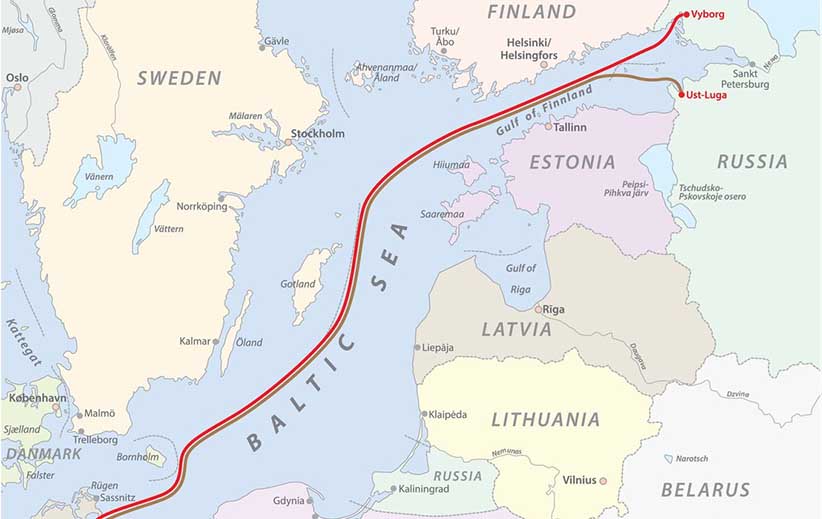
On many matters our ‘quality’ media serve us passably well but this enables a greater lie. They must show themselves trustworthy even if it embarrasses high office. (Not only does long term capacity to manufacture consent depend on it. So too, on pain of losing market share, do their business models.) But the trust gained helps them mislead us, more by lies of omission 1 than commission, on matters of critical concern to the power they ultimately serve. Never more so than when vilifying states and leaders in the way of empire designs.
Confirmations of this truth abound in respect of the proxy war on Ukraine. Despite a battery of documented facts to the contrary – see the the bullet list in this post – all sections of Western corporate media parroted the lie that Russia’s SMO of February 2022 was unprovoked …
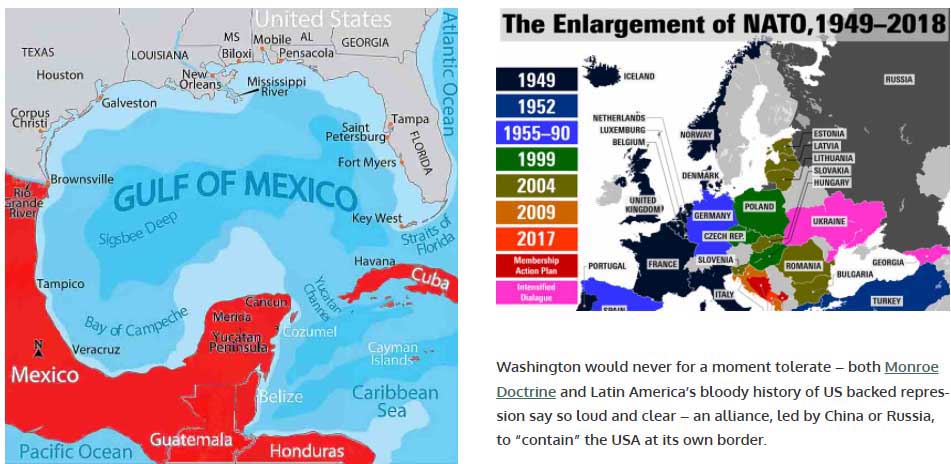
… which prompted Noam Chomsky – who, unlike me, criticised Russia’s move 2 – to quip:
Of course, it was provoked. Otherwise, they wouldn’t refer to it all the time as an unprovoked invasion. By now, censorship in the US has reached a level beyond anything in my lifetime. You are not permitted to read the Russian position.

See this sample of media fury at Tucker Carlson allowing Westerners to hear in his own words the RF President
Too spoilt for choice to stoop to anachronism, my aforesaid list of provocations left out that act of appalling ecocide on September 26, 2022:
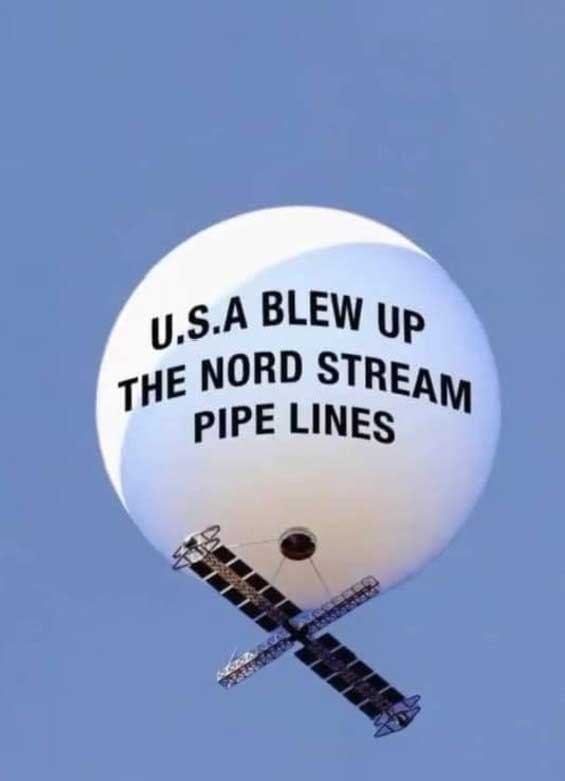
Both Joe Biden – “if Russia invades Ukraine we will stop Nordstream” – and Under Secretary of State Victoria Nuland – “one way or another Nordstream will not move forwards” – had given advance warning of US intent to stop the supply of cheap gas to Europe. 3 4 Washington had the means, the motive and – with the southwest Baltic a NATO pond – the opportunity. The world and its grandma knows it was Uncle Sam wot dunnit.
Or outsourced the job.
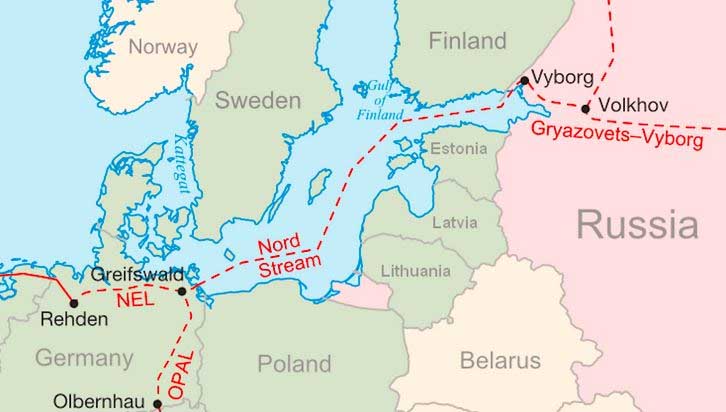
On the rare occasions corporate media refer to the crime at all, they speak of an unfathomable mystery; wisely refraining from demanding independent and thoroughgoing inquiry. When all is said and done, there are limits to the show of feisty truth-seeking a journalist, editor or for that matter proprietor is up for.
If they know what’s good for their careers.
All the same, those less prone to media induced amnesia may recall that in the aftermath, every Western columnist finger pointed dutifully at Moscow as prime suspect. Since this implied the corollary – too absurd to say out loud – of a Kremlin so stupid as to forget that to starve Europe of energy (and Russia of income) it had only to turn off the tap, it was swiftly dropped, and the affair filed with the Marie Celeste and other Inexplicable Mysteries Of The Deep …


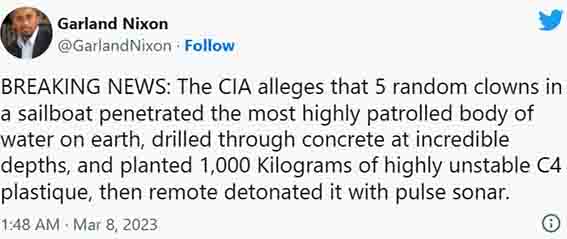
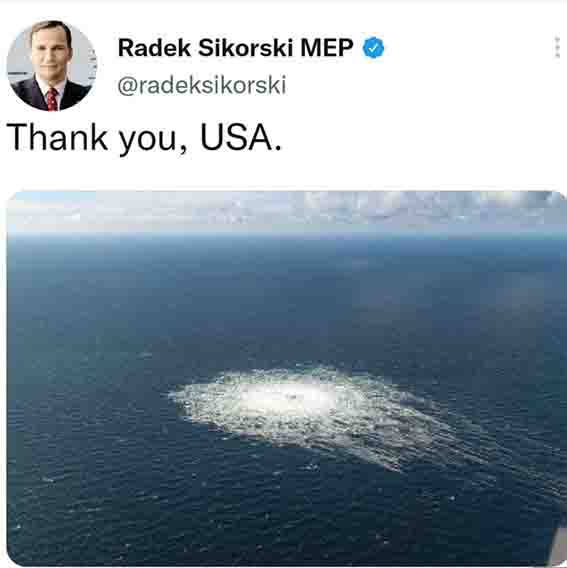
Radek Sikorski, a Polish MEP married to US Neocon Anne Applebaum, soon deleted this ill-judged tweet
… though not before Caitlin Johnstone had a field day with Western political and media elites’ genius for ignoring the elephant in the room. See, It’s only a conspiracy theory if it’s anti-USA.
*
But as I will keep saying, we are where we are. Nordstream ecocide being ancient history, let’s fast forward to what’s currently afoot in that icily troublesome inlet. Around the time Trump got himself re-elected I heard Dmitry Orlov in conversation with Nima Alkhorshid. As an aside to a discussion of the implications for the Ukraine, Dmitry referred to “Great Britain” as an annoying little dog in the room, yapping and biting at ankles until someone removed it so the grown ups could talk.
I have a similar take on the Baltic States. But at times of heightened tension, even the noisy belligerence of lapdogs who know – or think they know – their masters have their backs can trigger trouble. Over to Andrew Korybko, writing just yesterday. Did no one tell him it was St Valentine’s Day?
Will The EU Seize Russia’s “Shadow Fleet” In The Baltic?
A major incident at sea could instantly spark a New Cold War crisis that brings the Baltic front of this competition to the center of global attention.
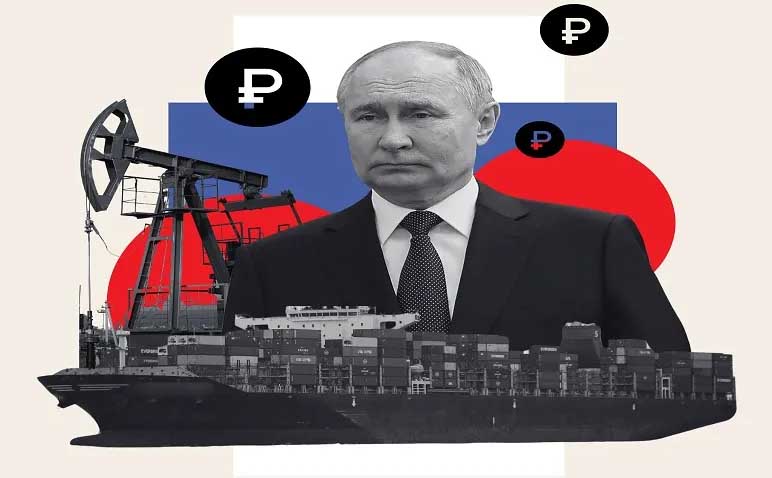
Politico reported last week that some EU countries might seize Russia’s “shadow fleet” in the Baltic Sea on the pretext of complying with international piracy and environmental laws. They might also pass new national laws to legitimize this too. Finland’s seizure of one such ship last December on the pretext that it was involved in cutting an underwater cable allegedly inspired them to consider doing so regularly. The purpose would be to slash the Kremlin’s foreign revenue flow from sales of discounted oil to Asia.
Around 40% of its “shadow fleet” transits through the Baltic Sea, amounting to a little less than 350 vessels whose total business was roughly equivalent to around one-third of Russia’s annual defense budget, so stopping them from operating there could deal a powerful financial blow to the Kremlin. There are several challenges inherent in these plans which make them a lot more difficult to pull off than policymakers might think, however, and were touched upon in Politico’s report to their credit.
First of all, international law and third countries’ ownership of some “shadow fleet” vessels mean that hefty political and legal costs might follow the seizure of even a single ship, something that Finland is only just now discovering after December’s dramatic incident. These consequences might result in them rethinking the wisdom of seizing any more ships, especially if they can’t count on the EU as a whole to back them up, let alone NATO’s American leader.
The last-mentioned concern segues into the second point about the risk of escalation in the event that Russia dispatches naval convoys to escort its “shadow fleet” through the Baltic. The deputy chairman of Russia’s parliamentary defense committee warned that “any attack on our carriers can be regarded as an attack on our territory, even if the ship is under a foreign flag.” Trump doesn’t favor escalation against Russia, at least at this time, so he might not extend Article 5 guarantees to allies that seize such vessels.
And finally, all of this might simply be too little, too late. Russia and the US have already begun backchannel talks on Ukraine so their proxy war might end by the time that the stereotypically sluggish EU finally decides whether or not to support the seizure of Russia’s “shadow fleet” in the Baltic. Moreover, this wasn’t hitherto seriously considered due to the two aforesaid reasons, which remain relevant. It’s therefore unlikely that the bloc will suddenly change its calculations.
The preceding points raise the question of why this is even being considered, which might be as simple as some EU countries like the ultra-hawkish Baltic States wanting to make it seem like they haven’t yet exhausted their policy options against Russia. The realization that there’s nothing left that they could realistically do to contain it might lead to deep demoralization since everything that they’ve already done hasn’t stopped Russia’s on-the-ground advance nor collapsed its economy like they expected.
The other two reasons might be even simpler in the sense that they could have also convinced themselves that just talking about this could deter Russia’s “shadow fleet” from operating in the Baltic and/or encourage Trump to escalate in Ukraine. Neither outcome is likely to materialize but that doesn’t mean that they still don’t sincerely believe that they’re possible. These political fantasies could quickly become dangerous, however, if any of the associated states tries to unilaterally bring them to fruition.
A major incident at sea could instantly spark a New Cold War crisis that brings the Baltic front of this competition to the center of global attention. If this occurs while Trump is still negotiating with Putin, then it’s extremely unlikely that he’d have the aggressor’s back against Russia since it would be obvious that this is a “deep state” provocation aimed at sabotaging a peace deal, but his approach could change if those talks collapse and he then decides to “escalate to de-escalate” on better terms for the US.
That could backfire though if Putin authorizes the navy to defend his “shadow fleet” as a reciprocal escalation following the precedent that he established last November. Back then, he authorized the first-ever use of the hypersonic Oreshniks in response to Ukraine using long-range Western missiles against targets within Russia’s pre-2014 borders, which signaled that the days of him backing down are over. He used to exercise self-restraint to avoid World War III but that only inadvertently invited more aggression.
Putin is therefore expected to strongly respond to the scenario of European countries seizing his “shadow fleet” in the Baltic, which could lead to a Cuban-like brinksmanship crisis that might easily spiral out of control. Trump doesn’t appear willing to risk World War III over slashing the Kremlin’s foreign revenue flow so he’d probably either decline to approve such a provocation or would abandon whichever ally unilaterally carries it out in defiance of his warnings not to.
Reflecting on all the insight that was shared in this analysis, Russia’s “shadow fleet” shouldn’t have anything to worry about since the odds of European countries systematically seizing its vessels are low, though some of them might still try to capture a few ships on spurious pretexts like last December’s. As long as this is extraordinarily rare, then Russia might not escalate just like how it didn’t less than two months ago, but any ramping up of that policy would almost certainly engender a strong response.
* * *
- In the late sixties two social scientists, Maxwell McCombs and Donald Shaw, focused on “agenda setting”, its essence captured by the observation that media may not always tell us what to think, but sure do tell us what to think about.
- Leaving aside those happy with the kindergarten fiction of a land grab by Evil Putin, and focusing instead on those who did see the extent of the West’s provocations but insisted she should not have taken the bait, I’ve yet to hear any of the latter set out a convincing alternative path she could have taken.
For more on this, see footnote 2 of my post last March, Russia and the art of war. - Yet another media lie of omission is their avoidance of the truth that while Washington did indeed miscalculate Russia’s strength, one clear win has been to draw Europe more closely into its imperial orbit. Soaring energy costs, forcing factories into liquidation or relocation in the US, are one of the more visible aspects of this.
- Ms Nuland, married to Robert Kagan, co-author with Paul Wolfowitz of the Project for A New American Century – and she a non-party Neocon who served under Clinton, Bush, Obama and Biden – oversaw the Maidan coup of 2014, which ousted the democratically elected Viktor Yanukovych to install a US puppet regime and plunge Ukraine into eight years of civil war, then three and counting as an expendable proxy against Russia. As I’ve said, corporate media lie more by omission than commission (this being not only safer but in the long run more effective in shaping public opinion). A case in point is Western media drowning out a serious offence with a comedy show of outrage over a lesser one. When Russia’s FSB released that eaves-dropped phone call between Nuland and Kiev’s US Ambassador Geoffrey Pyott, the media-fest over her “fuck the EU” remark buried a more serious revelation. Obama’s (and Hillary’s) Assistant Secretary of State had been recorded handpicking ministers – ruling some in, others out – for the US-pliant cabinet she was crafting to replace that of the incumbent President Yanukovych.

On footnote 2 the position described is perhaps a little kind?
Simply because such reticence is absent on the similar wedge issue of Gaza. A position which recognises that if you give those seeking, let’s go with, lebensraum, in one place it will encourage them to continue.
Yet no such consideration is given in the case of Ukraine.
Most odd.
Your original referred to my footnote 1, Dave. Since I’ve just added a new footnote 1, I’ve taken the liberty of amending the first line of your comment. It now points to footnote 2.